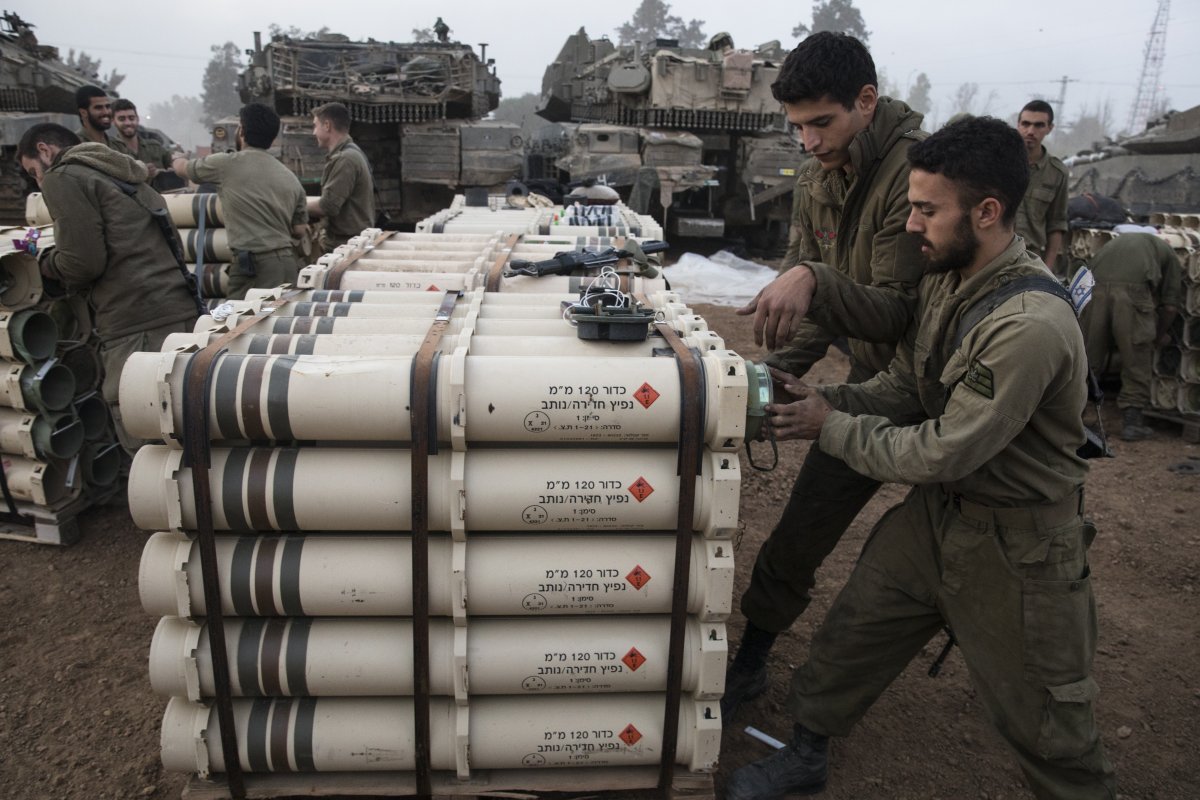Nick Mordowanec
The Israel military is shifting the deployment of personnel out of the Gaza Strip, potentially in preparation for a wider regional war in the weeks and months to come.
On Monday, the Israel Defense Forces (IDF) announced that thousands of troops would be redeployed and that some reservists from at least two brigades would return home to their families and jobs as soon as this week. Soldiers that belong to three other brigades will return to scheduled training, marking the largest troop drawback since Israel was attacked by Hamas nearly three months ago.
After Hamas launched on October 7 the deadliest Palestinian militant attack in Israel's history, the country unleashed its heaviest-ever airstrikes on Gaza. Israeli officials have said that 1,200 people were killed in Hamas' assault, according to the Associated Press, while the Gaza Ministry of Health says more than 21,900 Palestinians have died in the conflict.
Speaking of the troop drawdown, the IDF told Newsweek on Monday, "This move is expected to significantly alleviate economic burdens and enable them to gather strength for upcoming activities in the next year, as the fighting will persist and their services will still be needed."
The IDF spokesperson added: "These adaptations aim to ensure effective planning and preparation for the continuation of operations in 2024. The IDF recognizes the need to plan ahead, anticipating additional tasks and warfare throughout the year."

Israeli soldiers organize tank shells after returning from the Gaza Strip on Monday. The military has announced its biggest troop drawback since the October 7 attack by Hamas.
Israel said that more than 8,000 Hamas militants have been killed, according to the AP, but has not provided evidence. The nation blames Hamas for the high civilian death toll and turmoil in the region. Approximately 85 percent of Gaza's 2.3 million residents have been displaced.
The troop drawdown could also signal a different military course of action beyond Hamas and Gaza, potentially shoring up Israel's northern border should the war escalate to include Lebanon's Iran-backed Hezbollah.
Speculation about Hezbollah's interference in the Israel-Palestinian conflict was immediate following the October 7 attack. Israeli Prime Minister Benjamin Netanyahu spoke about the potential use of precision-guided munitions being accumulated by Hezbollah, the Lebanese Shiite Muslim political party that has an armed wing of the same name, and whether Israel could deter any attacks with its Iron Dome defense system or other methods
Israel's military said it carried out an airstrike on Monday on the Lebanon border, where artillery fire has become customary, according to Reuters.
Daniel Hagari, an Israeli military spokesman, told media outlets on Sunday night that "prolonged fighting" against Hamas and other potential adversaries could last throughout most or all of 2024.
The "economic burdens" described by the IDF spokesperson are likely a reference to negative domestic economic news recently.
The Taub Center for Social Policy Studies, a nonpartisan think tank in Israel, reported in late December that the Israeli economy was on the verge of shrinking 2 percent this quarter because of reservists leaving their jobs to fight in the war and other negative effects, according to The New York Times.
About 20 percent of the country's workforce—an increase of about 17 percent since the Hamas attacks—disappeared from the labor market in October, as some 9,000 individuals were either called up to fight, stayed home to take care of children who were not in schools or were displaced because of physical damage affecting workplaces.
Danny Danon, a member of the Knesset and Israel's former ambassador to the United Nations, told fellow Likud party members that the United States should shoulder some of the blame for the newly announced military deployment.
"Israel's gains from the war are being compromised because of U.S. pressure," Danon told Newsweek. "Surrendering to this pressure does not advance the goals of the war; it will not ensure the release of our hostages nor the defeat of Hamas. If Hamas perceives that Israel will halt its operations regardless, what incentive do they have to negotiate?"
Danon went on: "You led the country at the start of the war with determination, clarity and strength, and the results were tangible. We must maintain this momentum. The message currently being conveyed to [Hamas leader and Palestinian official Yahya] Sinwar about the withdrawal of our troops is highly favorable."
U.S. Defense Secretary Lloyd Austin and Israeli Defense Minister Yoav Gallant met on December 28 and discussed threats to regional security and Hezbollah's destabilizing activities in southern Lebanon.
A readout of a December 22 phone call between U.S. Secretary of State Antony Blinken and Gallant shows that Blinken discussed the continued efforts to release all the remaining hostages—in addition to providing increased levels of humanitarian assistance to Palestinian civilians in Gaza.
Blinken also "stressed the importance of measures to prevent the conflict from expanding, including affirmative steps to de-escalate tensions in the West Bank and to avoid escalation in Lebanon," according to the readout.
No comments:
Post a Comment